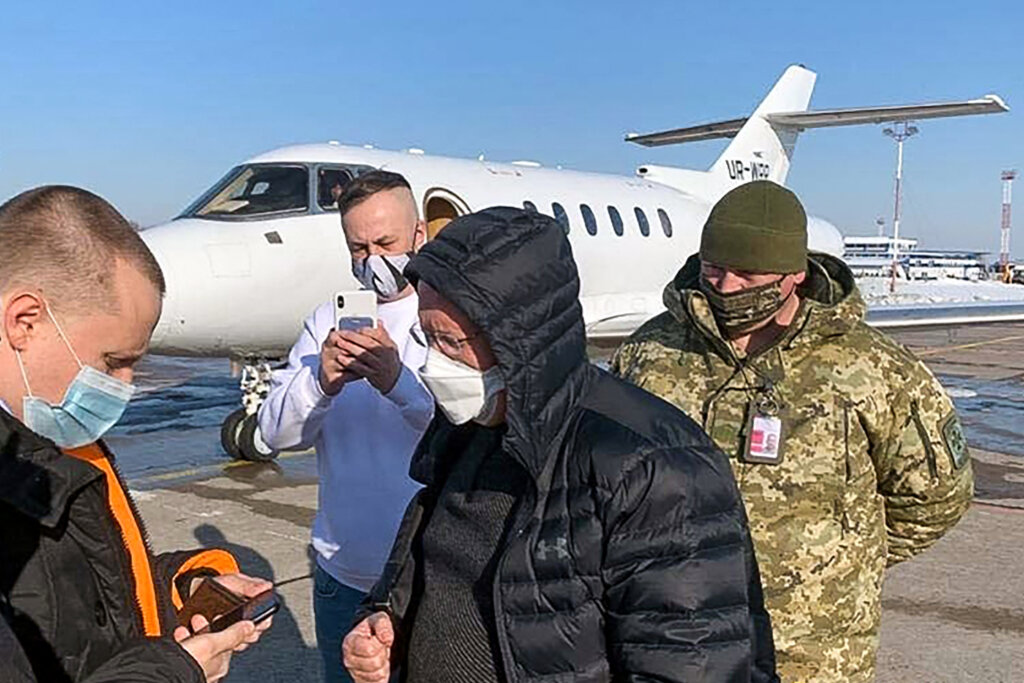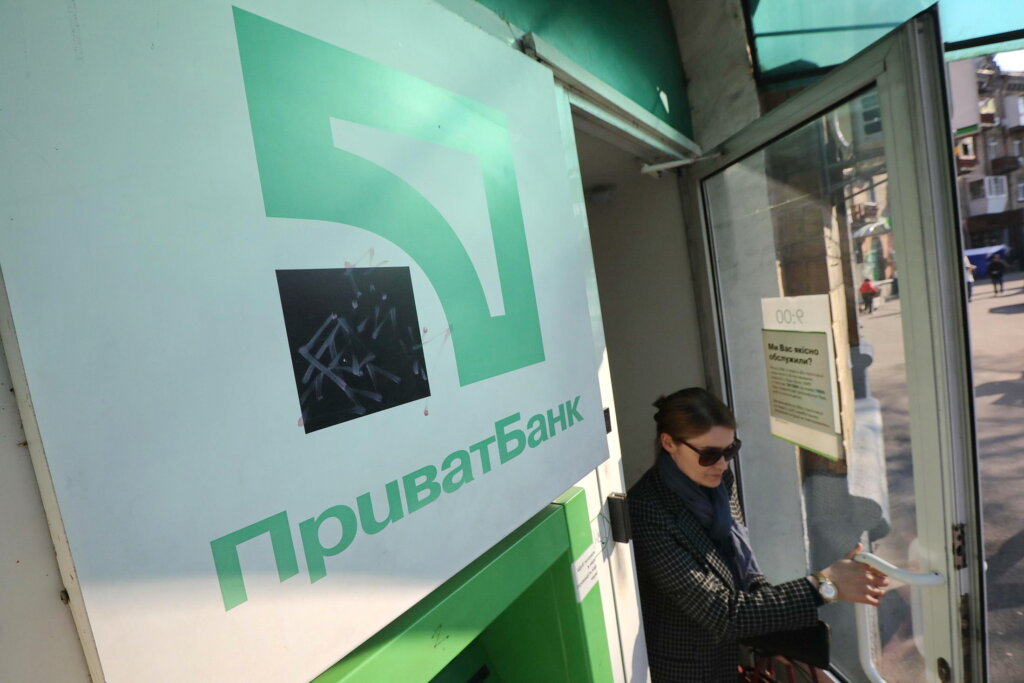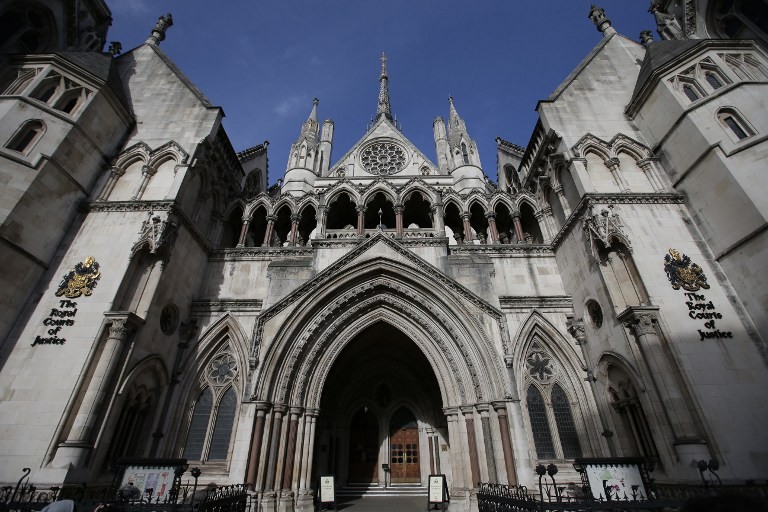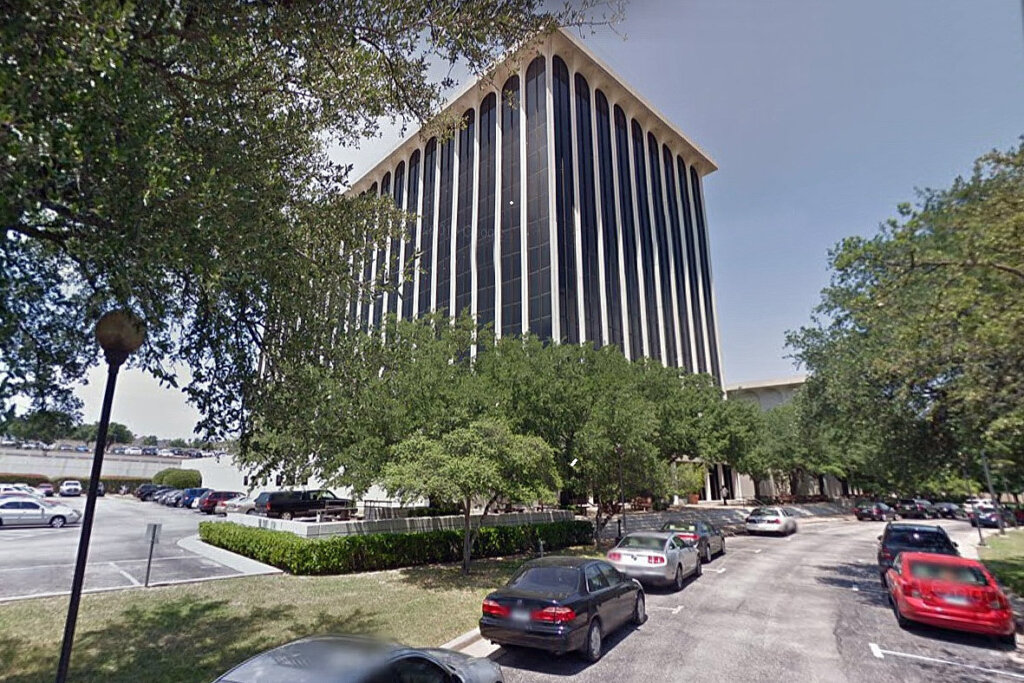After three years of investigation, Ukraine’s detectives have detained the first suspect in a major bank fraud case.
PrivatBank’s former first deputy CEO Volodymyr Yatsenko was pulled from a plane chartered by oligarch Ihor Kolomoisky minutes before he had a chance to escape over the border to Vienna, Austria, on Feb. 22.
The court charged Yatsenko with embezzlement. His alleged accomplices, former CEO Oleksandr Dubilet, who reportedly lives in Austria, and head of the financial management department Olena Bychikhina, who also resides abroad, were charged in absentia.
The three are suspected of stealing over Hr 136 million (about $5 million) shortly before the state nationalized PrivatBank over large-scale financial fraud that left the bank with a $5.5 billion gap in its ledger.
The National Anti-Corruption Bureau, or NABU, is also investigating employees of the National Bank of Ukraine, who may have participated in the theft. The central bank also faces a probe for failing to act to stop the wider alleged $5.5 billion fraud scheme that lasted over a decade and was widely known in the banking sector.
For now, the NABU is tight-lipped about the possible future arrest of the alleged masterminds of the scheme, oligarchs Ihor Kolomoisky and Gennadiy Bogolyubov. Both have repeatedly denied wrongdoing.
According to Kyiv Post sources who were not authorized to talk to the media, U.S. diplomats made it clear to Ukrainian officials that they were watching the PrivatBank case closely and asked when charges would be issued.
The U. S. recently showed progress in its own investigation of Kolomoisky, seizing some of his property in the U.S. last year. Criminal charges may be on the horizon.
In comparison, Ukraine’s investigators have been lagging behind. The latest charges may mean they’re finally emboldened to act, in spite of Kolomoisky’s power in Ukraine.
Yatsenko’s arrest
Yatsenko’s arrest and charges against someone as highly-placed as Dubilet are important steps towards justice, experts believe.
NABU had almost lost its quarry. Immediately after charges were filed, Yatsenko bolted for the airport and jumped into a plane chartered by Kolomoisky, suggesting that someone in the justice system tipped him off. Law enforcement took the unusual step of grounding the plane before it left Ukrainian airspace.
The High Anti-Corruption court set a bail of Hr 52 million ($1.9 million), which Yatsenko paid on the same day, despite his lawyers claiming that he’s cash-poor. He must remain in Dnipro Oblast and wear an electronic tag.

An officer of Ukraine’s National Anti-Corruption Bureau arrests PrivatBank’s former first deputy CEO Volodymyr Yatsenko in Kyiv Boryspil International Airport after he tried to leave Ukraine on a charter plane on Feb. 22, 2021. Yatsenko was charged with embezzlement and was released on bail on Feb. 25, 2021. (AFP)
Prosecutors said Yatsenko had Hr 83 million (about $3 million) in Universal Bank, which uses the Monobank software suite that Yatsenko co-developed.
Yatsenko’s five lawyers spent eight hours trying to persuade the court that Yatsenko is not a flight risk, despite his attempt to leave. Yatsenko called his departure a coincidence and said he was flying to Vienna for a previously scheduled doctor’s appointment, after which he would return to Ukraine to take his family on a trip to the Maldives.
Yatsenko owns property in Vienna and has lived in both Austria and Ukraine since 2017, according to NABU. He also has a helicopter, a boat and an impressive car fleet. Yatsenko’s real estate took three pages to list, the prosecutors said at the court hearing. They believe his wealth makes it very easy for him to run away.
The prosecutors asked the court to set bail at Hr 136 million, the sum of Yatsenko’s alleged theft. He said he should not pay at all as he already returned the Hr 136 million to PrivatBank.
Where is the money?
After being stolen, PrivatBank’s Hr 136 million ended up in the account of insurance company Ingosstrakh, which Yatsenko and Dubilet control through other shareholders, according to NABU.
Bychikhina simultaneously worked at PrivatBank and Ingosstrakh at the time of the transfer.
According to prosecutors, the trio made two fraudulent transfers to the insurance company’s accounts disguised as deposit payments.
To make it look legitimate, they backdated the payment documents. These documents stated that Privatbank owed Ingosstrakh Hr 136 million as “indexed commission for a change in the hryvnia-dollar rate.” The bank’s original deposit contract with Ingosstrakh doesn’t include it.

A woman leaves a PrivatBank branch on April 4, 2019 in Kyiv. When the bank was owned by billionaires Ihor Kolomoisky and Gennadiy Boholyubov, investigators found that $5.5 billion allegedly stolen was funnelled out of Ukraine through a PrivatBank subsidiary in Cyprus. Neither Ukrainian nor Cypriot banking regulators caught the transactions in time. The state now owns the bank. (Kostyantyn Chernichkin)
After the state nationalized PrivatBank, it sued its former owners for its missing money. The oligarchs sued back, trying to regain control of the bank.
Hundreds of lawsuits are open in courts across Ukraine, in the U.S., U.K, Switzerland, Cyprus, and Israel. As minority stakeholders, Dubilet and Yatsenko also disputed the PrivatBank’s nationalization in court.
Recently, PrivatBank demanded its Hr 136 million back and filed a lawsuit with the Dnipro Economic Court. Ingosstrakh paid back Hr 136 million on Feb. 1. The money came from Ingosstrakh’s account in A-Bank, which belongs to Ihor and Hryhoriy Surkis, once Kolomoisky’s business partners and former PrivatBank insiders.
Yatsenko told the court that he should be free from charges because the money was paid back. The NABU said this changes nothing — he still committed theft.
PrivatBank and the chamber of secrets
Before nationalization, PrivatBank contained a smaller bank that ran Kolomoisky’s alleged money laundering scheme, multiple investigations found.
Yatsenko led this secret unit, according to the “Privat Story: The Rise and Fall of Ukraine’s Largest Bank,” a book by investigative journalists Graham Stack and Andrii Ianitskyi.
The Kyiv Post’s sources said that Yatsenko curated the unit’s work.
“(Yatsenko) was in charge of the corporate direction. And 95% of PrivatBank’s corporate loans went to the bank’s insiders,” investment banker Serhiy Fursa wrote on Facebook. “This means that was the same money that was embezzled.”
PrivatBank is suing Kolomoisky and Bogolyubov in London, alleging that $1.9 billion was laundered through six companies in Britain and the British Virgin Islands. One piece of evidence in this case was a spreadsheet found on the laptop of Tetiana Gurieva, a former deputy head of the board of PrivatBank, who allegedly worked in the secret unit.

The Royal Courts of Justice building, which houses the High Court of England and Wales, is pictured in London on Feb. 3. (AFP)
This file shows how PrivatBank issued loans to the six companies, which rarely paid them back.
To cover it up, the bank’s owners used a “loan recycling scheme” that issued new credit to the owners to pay off the interest on old loans.
The money flowed through subsidiaries, often in Cyprus. Part of it was used to buy businesses and real estate in the U.S.
Kolomoisky and Bogolyubov invested stolen from PrivatBank money in real estate in Louisville, Dallas, Cleveland and other U.S. cities, according to the U. S. Department of Justice which accused the oligarchs of fraud and money laundering and moved to seize their property via three civil forfeitures.
American charges
International pressure may have played a role in the timing of Ukraine’s latest charges.
Kolomoisky is reportedly under investigation by the FBI and several of his former business partners have testified in U.S. court. Last year’s civil forfeiture complaints didn’t charge Kolomoisky and his associates with a crime but stated that he was involved in money laundering.
Ukrainian officials, especially the Zelensky administration, may want to avoid looking bad if another country brings criminal charges against the oligarchs first, according to Kyiv Post’s banking sources. At the same time, Ukraine is trying to demonstrate to the new administration in the Oval Office that it’s cracking down on fraud.
“As Vice President, Biden personally led U.S. efforts to reduce the influence of oligarchs in Ukraine under then-President Obama, and several senior members of his cabinet have recently voiced similar sentiments, especially related to the United States’ role in stemming the flow of oligarchic money globally,” said Alexandra Wrage, president of the anti-bribery association TRACE.
She expects that the emphasis on seizing stolen assets from oligarchs and prosecuting them will grow under the administration of U. S. President Joe Biden.
The pressure may be more direct. According to Kyiv Post sources, U.S. diplomats recently spoke to Ukrainian officials about charges related to PrivatBank.
Biden is personally aware of the importance of the PrivatBank case. In a leaked recording of a conversation with Former President Petro Poroshenko in November 2016, Biden pressured him to complete the nationalization.
“I know Kolomoisky is a pain in the ass and a problem for everybody but it really is critical that you guys figure this one out,” Biden said then.
Daniel Langenkamp, the spokesman of the U. S. Embassy in Kyiv, said he can’t comment on diplomats’ private conversations or ongoing legal cases but praised the Ukrainian government.
“We… take a close interest in the Ukrainian government’s efforts to combat corruption and applaud their efforts to hold individuals responsible for stealing billions from the Ukrainian people,” he said.

This 20-acre office campus in Dallas, Texas was part of a civil forfeiture stemming from the U.S. investigation into Ihor Kolomoisky. It was allegedly bought using sums embezzled from PrivatBank. (Google Map)
It’s unknown whether Ukraine or the U.S. will get to the oligarchs first, said Olena Shcherban, a lawyer at Anti-Corruption Action Center, AntAC.
Shcherban believes it is unlikely that another Hollywood-style arrest — like the one of Ukraine’s former Prime Minister Pavlo Lazarenko in the airport of New York in 1999 — will happen.
Lazarenko was charged with money laundering and embezzlement of $200 million from Ukraine’s state budget and sentenced to jail. He was released in 2012 after spending six years in prison.
Ukraine unsuccessfully asked for Lazarenko’s extradition. The U. S. does not have an extradition agreement with Ukraine so it is also unlikely that Kyiv will give away Kolomoisky and Bogolyubov to the U.S. for trial, said Shcherban.
However, the U.S. can still charge the oligarchs in absentia.
“It is good that there is an investigation against them (the oligarchs) there. Maybe, it will push Ukrainian authorities to do something and demonstrate their political will,” said Shcherban.
As of now, nothing indicates that this political will is in place, she said.
“They charged suspects in a tiny episode that concerns the payment to the insurance company. Compared to a bigger case, looking into billions in stolen money, this was a small move,” Shcherban said. “It surprises me why (Prosecutor General Iryna) Venediktova started from this smaller case.”
NABU is investigating Kolomoisky and Bogolyubov’s alleged theft of $150 million from PrivatBank, according to the Kyiv Post’s sources in the bureau.
More arrests to come?
Both NABU and the Prosecutor General announced that other arrests in the PrivatBank case are coming up.
These may include officials or former officials from the National Bank of Ukraine.
According to sources close to the state banking system who were not authorized to speak to the media, dozens of current or former NBU officials may be investigated for negligence or worse — deliberately overlooking the massive, hard to miss fraud in PrivatBank, which had a suspicious reputation even before the bombshell report by corporate investigator Kroll Inc.
“No one could prove it with documents but everyone knew about it,” financial expert Ruslan Chorniy told the Kyiv Post in 2019. The bank’s reports greatly understated the sheer volume of related-party loans. PrivatBank’s loans to ferroalloys, hydrocarbons, hotels, football clubs and airlines should have raised alarm bells, experts told Kyiv Post.
The anonymous sources said that it’s likely that payoffs to central bank officials were made to keep occasional investigations from undermining the scheme.
